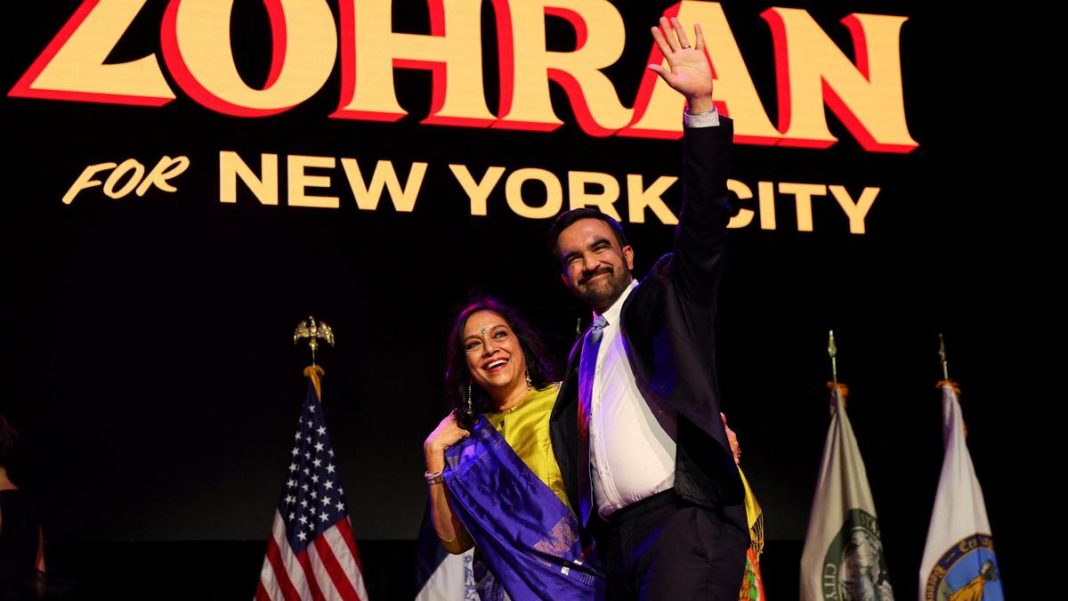New York City has elected its new Mayor, and the result sends ripples across the globe, particularly in India. Democrat Zohran Mamdani, an Indian-American, has secured a historic victory in the fiercely contested mayoral race, positioning himself as a significant new voice in American politics. His win is not just a local triumph but, as Mamdani himself declared, a potential blueprint for a national strategy aimed at challenging and ultimately ‘defeating’ figures like former President Donald Trump.
A Historic Win with Deep Indian Roots
Zohran Mamdani’s path to the Mayor’s office is as compelling as his political vision. Born in Kampala, Uganda, to Indian-Ugandan parents, his family’s journey through exile and immigration brought them to New York. His background as a public defender and his tenure as a New York State Assemblyman have anchored his politics firmly in the progressive movement, advocating fiercely for working-class families and marginalized communities.
His mayoral campaign resonated deeply with a diverse electorate, particularly in a city known for its vibrant immigrant population. Mamdani’s identity as a person of colour and a first-generation American who has ascended to lead one of the world’s most prominent cities holds immense symbolic weight. For the Indian diaspora globally, and in India itself, his victory is a source of immense pride, showcasing the growing influence and contributions of the community in international politics. It highlights a narrative of aspiration and achievement that transcends geographical boundaries, making headlines far beyond the five boroughs.
The Progressive Mandate and National Implications
Mamdani’s campaign was built on a bold progressive platform addressing some of New York’s most pressing issues: the affordability crisis, the need for robust public transit, comprehensive climate action, and significant criminal justice reform. His victory signals a powerful mandate for these progressive ideals within the Democratic Party, potentially shifting the party’s centre of gravity in America’s largest city.
It was in his impassioned victory speech that Mamdani explicitly connected his local success to a broader national imperative. He articulated a vision where grassroots organizing, a focus on tangible community benefits, and a clear progressive agenda could serve as a powerful counter to divisive national politics.
“This victory isn’t just about New York City; it’s a blueprint for progressive change across America,” Mamdani stated, drawing thunderous applause from his supporters. “What we’ve achieved here, by uniting communities around a vision of justice and equity, shows precisely how we can confront and ultimately defeat the forces of division and reaction, including figures like Donald Trump, at every level of government. This is how we build a movement that prioritizes people over profit, and unity over division.”
This statement has immediately drawn attention from political observers across the US, who are keen to understand if the specific strategies employed in a hyper-liberal urban centre like New York can indeed be replicated in other, more politically varied, parts of the country. Mamdani’s win is being watched closely as a potential test case for the progressive wing’s strategy to galvanize voters ahead of crucial national elections.
Resonating Beyond New York: An Indian Perspective
The election of Zohran Mamdani is not merely a piece of American political news; it’s a development that carries significant resonance in India. Indian news outlets have prominently featured his win, celebrating it as another instance of the Indian diaspora achieving top leadership positions abroad. This narrative reinforces a sense of shared aspiration and global connectedness, especially given the historical ties between the two democracies.
Beyond the pride of heritage, his victory sparks discussions about the evolving political landscape in Western nations and the increasing diversity of their leadership. For Indian political observers, it offers insights into the American electorate’s appetite for progressive policies and how identity politics intersects with broader social and economic issues. While the political contexts of India and the US are distinct, the emergence of leaders like Mamdani prompts a broader dialogue on representation, social justice, and the power of grassroots movements, themes that are universally relevant in democratic societies.
Zohran Mamdani’s assumption of the New York City Mayoralty marks a pivotal moment, both for the city and for the broader American political narrative. His victory, steeped in a progressive vision and declared as a template to ‘defeat’ established political forces, sets the stage for a compelling new chapter in urban governance and national political strategy. For the global Indian community, it stands as a testament to the power of diverse voices in shaping the future of global cities and nations.




